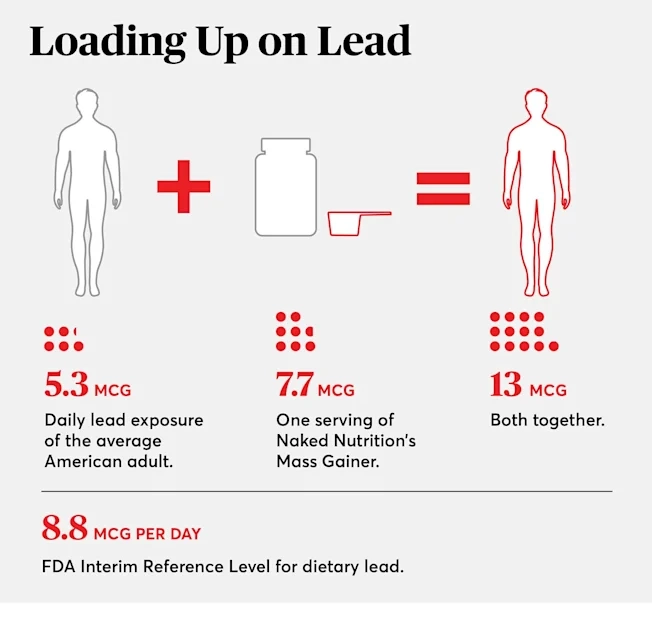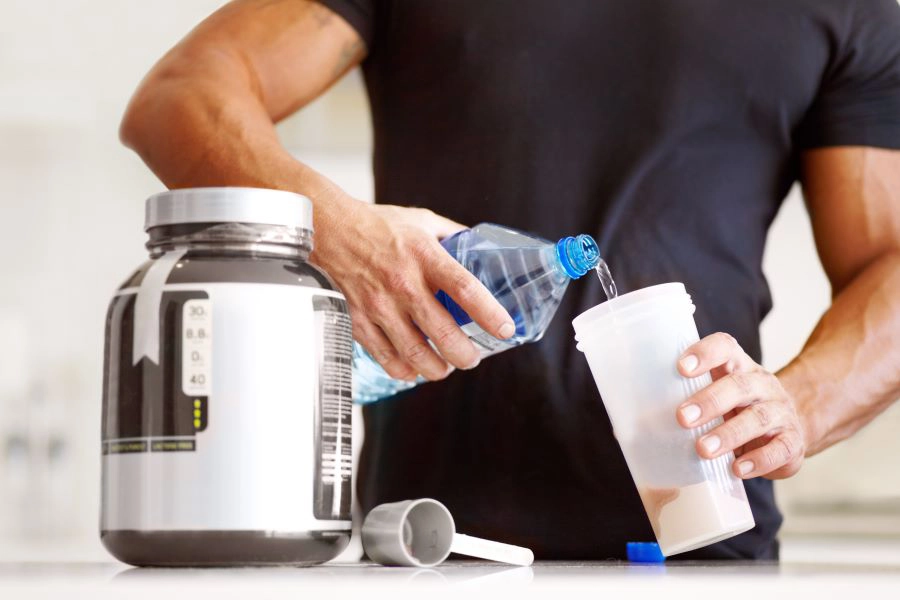Consumer Reports (CR) is warning that protein powders and shakes may contain high lead levels at unsafe concentrations. Its new study examined 23 products from popular US brands, over two-thirds of which contained heavy metals.
A single serving contained more lead than safety experts recommend for daily consumption, sometimes by over ten times. The nonprofit reported that lead levels were higher in its most recent report than it found 15 years ago. Additionally, there were fewer products with undetectable amounts of lead than before.
“It’s concerning that these results are even worse than the last time we tested,” says lead researcher Tunde Akinleye, CR’s chemist and food safety researcher. “We advise against daily use for most protein powders, since many have high levels of heavy metals, and none are necessary to hit your protein goals.”
Plant-based powders are most risky
Almost all the plant-based products CR tested have high lead levels. The nonprofit says Naked Nutrition’s Vegan Mass Gainer powder had the highest lead levels (7.7 μg per serving) — nearly twice as much lead per serving as the worst product analyzed in 2010.
Huel’s Black Edition powder contained 6.3 μg of lead and 9.2 μg of cadmium per serving.
A single serving of the two powders contained between 1,200 and 1,600% of CR’s concern level for lead, which is 0.5 µg per day. CR advises against using them at all.
Meanwhile, Garden of Life’s Sport Organic Plant-Based Protein and Momentous’ 100% Plant Protein contained 400 to 600% of CR’s concern level of lead, with the recommendation to limit intake to once per week.
CR also finds that Vega’s Premium Sport powder and Optimum Nutrition’s Serious Mass whey protein powder contain high levels of cadmium and inorganic arsenic, exceeding daily safe limits.
On average, plant-based products had nine times more lead than those found in dairy proteins and twice as much as beef-based ones.
Dairy-based proteins had the lowest amounts of lead, but half of the products had high contamination levels.
However, CR cautions against consumer panic. Most protein powders are fine to consume occasionally, as the levels are below the limit to cause immediate harm. It adds that most people don’t need protein supplements, as the average US citizen gets plenty of the nutrient.
 An FDA spokesperson told CR there is sufficient evidence for applying the 8.8 μg per day benchmark to all adults. (Image credit: CR).“For many people, there’s more to lose than you’re gaining,” says Akinleye about protein supplements. CR adds that studies have shown that vegans can get more than enough protein through diet alone.
An FDA spokesperson told CR there is sufficient evidence for applying the 8.8 μg per day benchmark to all adults. (Image credit: CR).“For many people, there’s more to lose than you’re gaining,” says Akinleye about protein supplements. CR adds that studies have shown that vegans can get more than enough protein through diet alone.
Lack of regulatory oversight
CR adds that the US FDA does not review, approve, or test supplements like protein powders before they are sold. Regulations also do not generally need to prove their products are safe, and there are no federal limits on heavy metals they can contain.
“The FDA can take action if it finds unsafe lead levels, but the lack of enforceable standards means it doesn’t happen nearly enough,” says Brian Ronholm, CR’s food policy director.
“The FDA’s lack of funding and staff makes the problem worse. Establishing enforceable limits in foods and supplements would go a long way in protecting consumers.”
Study details
CR purchased multiple samples of each product over three months starting last November. The team selected bestselling dairy, beef, and plant-based protein supplements from online retailers like Amazon and Walmart, and at food stores in New York state, such as the Vitamin Shoppe and Whole Foods Market.
All products met or exceeded the protein level label claim, according to the test, but 70% of them contained lead at levels over 120% of CR’s concern threshold. Three products contained excess cadmium and inorganic arsenic, toxic heavy metals that the Environmental Protection Agency (EPA) says are carcinogenic.
Manufacturer responses
The popularity of protein and near obsession in the US drives supplement sales and innovations of protein-fortified foods. CR notes that a compounding problem is the popularity of protein-fortified F&B, often made from the same problematic ingredients as supplements.
Innova Market Insights data shows that whey protein hydrosalate (WPH) is emerging as a leading ingredient for active nutrition, with 46% year-over-year growth from July 2023 to June 2025. Although WPH is most commonly found in sports powders (79%), its functional benefits indicate additional potential in sports bars and ready-to-drink products.
CR contacted the manufacturers of the 23 protein products, but BSN, Dymatize, Jocko Fuel, Muscle Milk, Owyn, PlantFusion, and Transparent Labs did not respond. Optimum Nutrition declined to comment, and Huel did not respond to questions about the amount of cadmium found in its product.
Many of the companies say lead naturally occurs and is difficult to avoid in plant-based products.
Equip Foods, Garden of Life, KOS, Momentous, Muscle Meds, Muscle Tech, Orgain, and Vega said they test their ingredients and finished products for heavy metals.
CR notes that Vega paid US$336,000 in penalties in 2013 to resolve allegations of violating California law requiring warnings for harmful chemicals in its products.
Some companies said they follow food safety advice from the FDA, EPA, WHO, and European Food Safety Authority. However, CR notes that most organizations do not have limits or guidelines for heavy metals in protein powders or dietary supplements.
CR also shared the results with the FDA, which said it will review the findings to inform testing and enforcement efforts.

